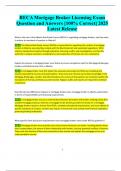Exam (elaborations)
RECA Mortgage Broker Licensing Exam Question and Answers [100% Correct] 2025 Latest Release
- Module
- Institution
RECA Mortgage Broker Licensing Exam Question and Answers [100% Correct] 2025 Latest Release What is the role of the Alberta Real Estate Council (RECA) in regulating mortgage brokers, and how does it enforce its standards of practice in Alberta? The Alberta Real Estate Council (R...
[Show more]



